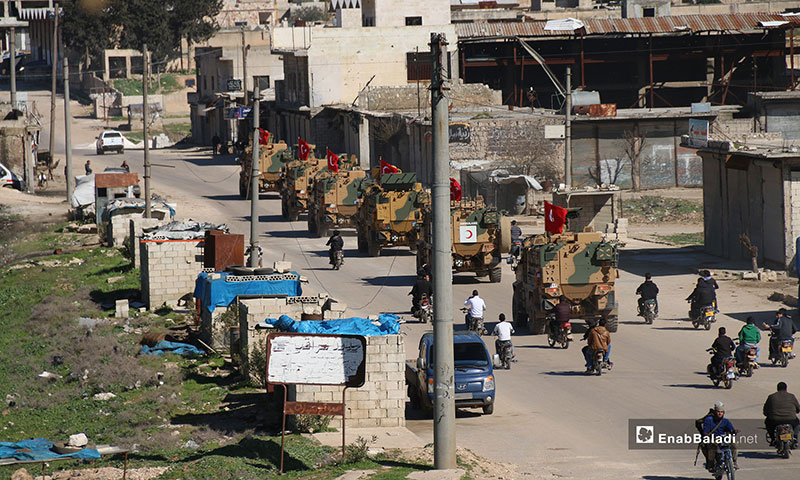



Carrying out patrols in the Syrian areas, ruled by deals and agreements between so-and-so sides to the conflict, has become a tradition, for the deals have turned these patrols into a fixed term and a prerequisite for the enforcement of other terms, which already happened in Manbij, Tall Rifat, Idlib province and the areas east of the Euphrates.
It was in Manbij, rural Aleppo in Syria’s north, when the launch of military patrols was discussed for the first time, as to rule out Ankara’s fear of those it referred to as ‘terrorists’ in the area. From there, the patrols developed into an indispensable factor in the areas’ the control of which is a matter of dispute.
In June 2018, Turkey and the U.S. concluded a deal concerning the city of Manbij. Both sides ratified a ‘road map,’ providing for establishing security and stability in the city, which Turkey eyes with extreme attention.
The city of Manbij, as a cause, was brought to the negotiations table in late May 2018, when the two sides to its deal agreed to have joint U.S.-Turkish forces in the city, in the presence of a local administration.
The reason why Turkey insisted on having its military forces there was its security-based concerns over the proliferation of the Syrian Democratic Forces (SDF), the backbone of which is none but the People’s Protection Units (YPG).
To rid of Ankara’s fears, Washington approved to launch patrols. With the U.S., Turkey did send several patrols to the area based on the ‘road map,’ while its other terms were not put completely into force due to the American procrastination.
The Syrian regime, driven by the U.S. waiting game, traced its way to Manbij’s deal, announcing its forces arrival into the city in early January, answering the (Kurdish) Units’ call to facing up what they called the ‘Turkish threats.’
The Syrian regime forces’ presence in the area was limited to the town of Arima, west of Manbij city, contrary to the statements of the Syrian government’s Ministry of Defense.
Akin to Manbij, the city of Tall Rifat, northern rural Aleppo, is also subjected to the patrols’ order, following a deal between Turkey and Russia.
The deal was concluded on the heels of SDF’s control of the city early 2016, which, then, surrendered its rein to the Syrian regime in March 2018.
In June of the same year, the city’s dignitaries held a meeting with Turkish officials to define the city’s fate, following joint Turkish-Russian negotiations.
The attendees, back then, decided that the Syrian regime forces exit the city, on the condition that they are replaced with Turkish-Russian patrols, in addition to the repatriation of the city’s civilians and the foundation of a local council, consisting of the city’s police which actually comprises members of the population. However, weapons were banned.
On March 26, 2019, Turkey and Russia declared the launch of the first ‘coordinated and independent’ joint patrol in the city of Tell Rifat, which the de-escalation agreement covers. The last patrol, nonetheless, was operated in mid-August.
In mid-March 2019, the first Turkish patrol, in cooperation with the Russian Military Police, was deployed on the outskirts of the city, on the line separating areas held by the SDF and those controlled by the National Army (NA), on the fronts of Ayn Daqnah, Mara’anaz and Minaq in the northern rural parts of Aleppo.
Russia also attempted to apply the patrol-based scheme on the areas held by the armed opposition in Idlib province and the rural parts of Hama, relying on the Sochi deal, signed by the Russian President Vladimir Putin and his Turkish counterpart Recep Tayyip Erdoğan in September 2018.
The ‘Demilitarized Zone’ deal has dominion over Idlib province’s fate and its geographical demarcations despite the obstacles that hampered the enforcement of all its terms.
The deal’s terms, ten in number, provide for establishing a demilitarized zone, 15-20 kilometers deep into the ‘de-escalation agreement’s’ areas, in addition to tasks assigned to the Turkish forces and the Special Military Police, which are “[to launch] coordinated patrols and make monitoring efforts using drones along the borders of the demilitarized zone.”
Nonetheless, the opposition factions, operating in Idlib province, refused the entry of Russian patrols into the areas they held. In retaliation, the Russian and the Syrian regime forces embarked on a military offensive on the borders of the ‘demilitarized zone’, despite the military patrols that Turkey deployed in the area.
On August 27, 2019, the Russian Minister of Defense, Sergey Shoygu, said that “Idlib agreements are being implemented, however, there are some difficulties.”
“Turkey is carrying out patrols inside the de-escalation area, while Russia continues to carry out patrols outside the area,” the Russian Minister of Defense added.
In early August 2019, Turkey and the U.S. concluded an agreement providing for establishing a ‘safe zone’ in north-eastern Syria, along the borders with Turkey. Both sides also agreed to operate joint patrols in the area.
Despite the haziness of the area’s details and the contradictory geographical dimensions that the Turks and the Americans are proposing, Turkey declared that joint patrols are to start on Sunday, September 8, according to a statement by the Turkish Minister of Defense Hulusi Akar.
Quoted by the Anadolu Agency, Akar added that “we consider the joint Turkish-U.S. helicopter flight in Syria’s north a chance to observe all that must be done on the ground, including the destruction of the terrorist fortifications.”
On August 7, 2019, Turkish and U.S. military officials agreed to set up a joint operations center to urgently perform initial measures, addressing Turkey’s concerns over its southern borders with Syria.
“The safe zone shall become a peace corridor, and every effort shall be made so that displaced Syrians can return to their country,” according to a statement by the American Embassy in Ankara.
if you think the article contain wrong information or you have additional details Send Correction